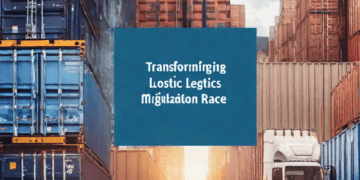Artificial intelligence (AI) and machine learning (ML) have become integral to our daily lives, aiding in routine tasks such as booking an Uber or filtering spam emails. Despite futuristic depictions, the practical implications of AI extend beyond sensationalized realms, profoundly impacting various sectors without garnering significant headlines.
In the logistics domain, the adoption of technology like AI and ML has been steadily rising, transforming processes amid the quest for digitization. Companies are increasingly leveraging these innovations to streamline operations and improve efficiency across supply chains.
The accountancy industry serves as a relevant example of AI’s impact, witnessing significant growth in the integration of these technologies. Reports forecast a substantial annual growth rate between 2022 and 2027, signaling impending changes in audit practices as firms seek more streamlined and efficient operations through AI-based automation.
However, concerns about AI replacing accountancy jobs remain unfounded. Instead, these technologies are poised to complement human intellect, enhancing data evaluation and consultancy services within the profession.
Efforts within firms to alleviate auditors’ burdensome administrative tasks are crucial. Providing platforms that enable employees to excel by reducing time spent on manual tasks can foster a more engaged workforce while enhancing overall productivity and retention rates.
AI’s role in automating repetitive tasks holds immense significance for the accounting industry, liberating time for auditors and improving operational efficiency. Studies have indicated that AI has significantly enhanced business productivity, allowing auditors to dedicate more time to complex tasks and client-oriented responsibilities.
AI’s impact goes beyond mere automation; it revolutionizes data search capabilities, facilitating improved information storage and retrieval for auditors. Enhanced search functionalities based on keyword suggestions and comprehensive data analysis redefine the way auditors access relevant content, ultimately leading to more accurate and efficient auditing processes.
Moreover, AI-driven metadata-based document management systems empower teams to collaborate seamlessly. This technology minimizes time wasted on searching for documents or navigating multiple versions, facilitating real-time collaboration and ensuring uniformity among team members.
In the logistics industry, AI and ML offer immense potential for enhancing operational efficiency, minimizing manual interventions, and ensuring a more streamlined supply chain. These technologies represent opportunities to refine existing processes rather than threats to the profession, ultimately resulting in improved service quality and empowering auditors to deliver practical solutions to clients.
The integration of AI and ML stands as a pivotal step toward a more digitized and efficient future for logistics, promising to revolutionize operations while augmenting human expertise in the field.
Stay on top of supply chain logistics news updates at The Supply Chain Report. Visit ADAMftd.com for free international trade tools.
#AI #ML #LogisticsTech #AccountingInnovation #Automation #AIImpact #DataManagement #TechInSupplyChain #AIForAuditing















